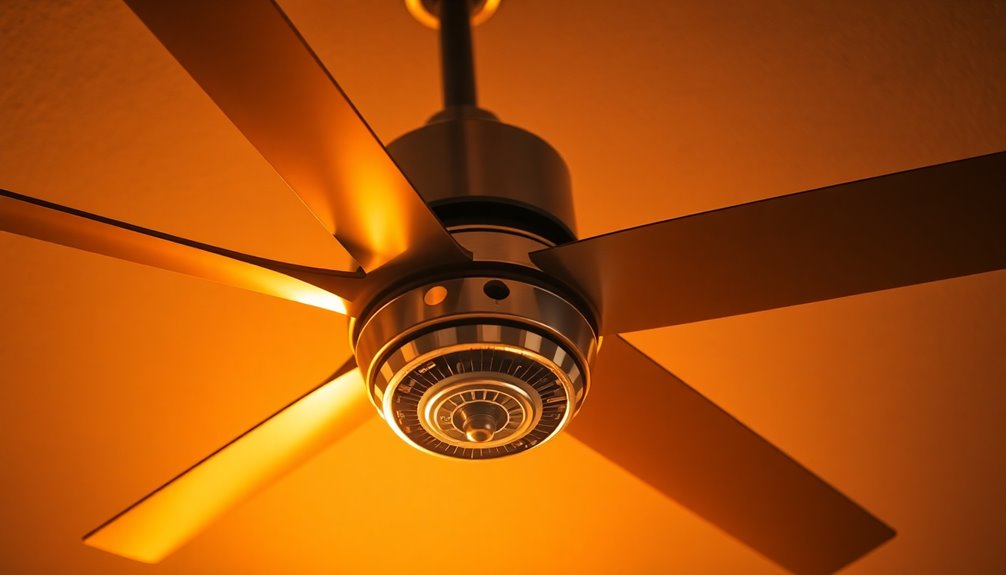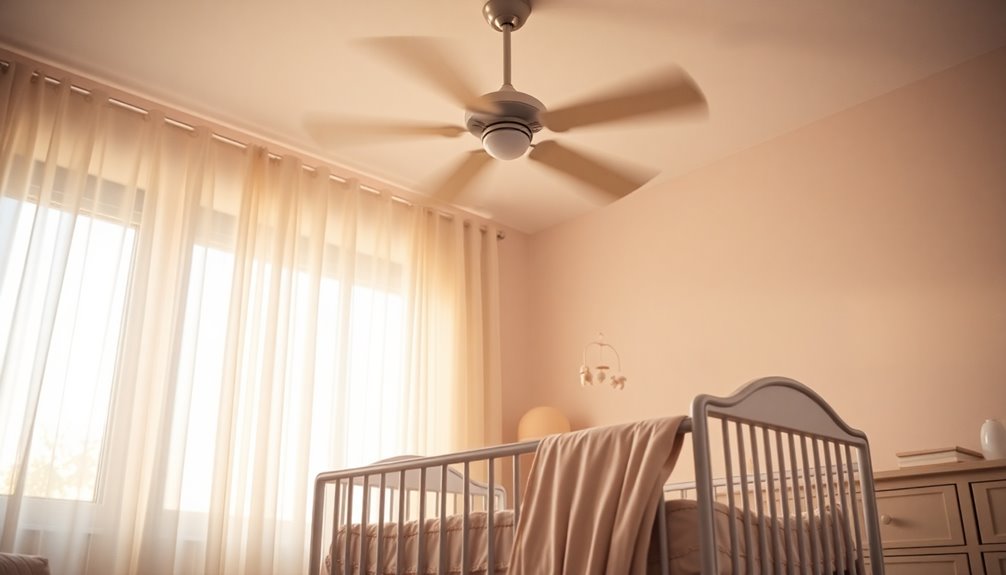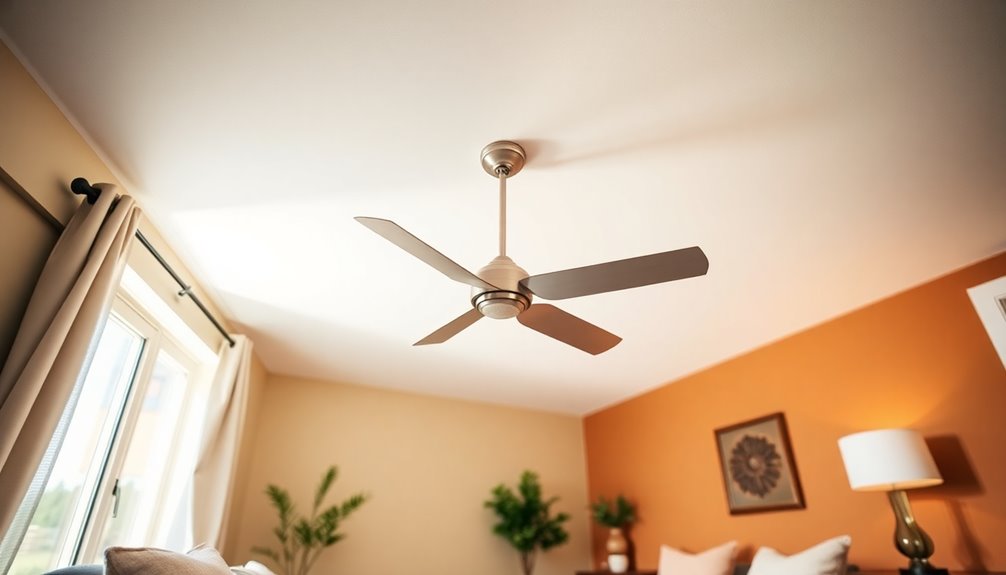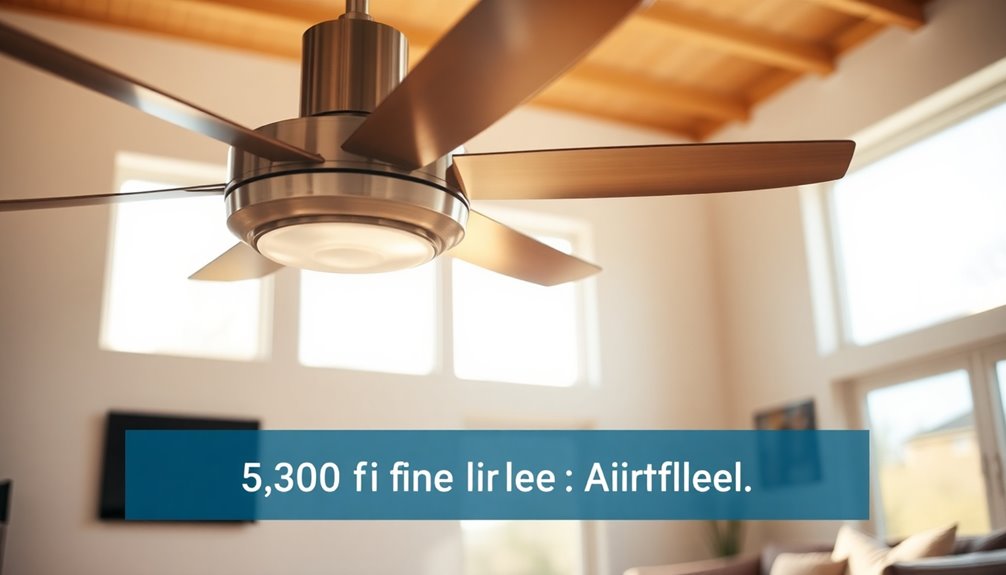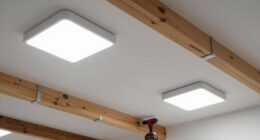Ceiling fans hum for several reasons, and it's usually an indicator of underlying issues. You might have loose screws or connections, which can cause vibrations. Insufficient lubrication in the motor increases friction and noise. If the blades are unbalanced, it can create operational sound too. Dust buildup may force the fan to work harder, adding to the hum. Electrical problems, like faulty wiring or incompatible switches, could also amplify the noise. Regular maintenance can help reduce these sounds, and there's plenty more to explore about keeping your fan running quietly and efficiently.
Key Takeaways
- Humming often results from loose screws or connections that cause vibrations during operation.
- Insufficient lubrication of the motor can lead to increased friction and noise.
- Unbalanced blades create operational noise and may cause mechanical imbalances.
- Dust buildup can make the fan work harder, resulting in additional humming sounds.
- Faulty wiring or incompatible dimmer switches may create electrical interference, amplifying the hum.
Common Ceiling Fan Noises

When you hear your ceiling fan humming, it's often a sign of underlying issues that can be easily fixed. This noise usually indicates that something isn't quite right, and addressing it can enhance your fan's performance.
One common cause is loose screws or connections, which can lead to an increased humming noise as the fan operates. You can typically resolve this with just a screwdriver.
Another potential culprit is insufficient lubrication of the motor. When the motor isn't properly lubricated, it can create friction, resulting in that annoying humming sound. Regular maintenance is key here—just apply a bit of lubricant to keep things running smoothly.
Sometimes, the hum can become more pronounced when incompatible electrical controls, like dimmers, are used. These aren't designed for ceiling fans and can lead to additional noise.
Finally, faulty motor bearings or an unbalanced blade assembly can also contribute to the humming. If you notice this noise, it may require adjustment or even replacement of parts.
Causes of Humming Sounds

Humming sounds from ceiling fans can stem from several factors that affect their operation. Often, the culprit is loose screws that allow vibrations, causing your fan to hum. Unbalanced blades can also lead to operational noise, creating that annoying humming ceiling sound.
Regular maintenance is essential because a poorly lubricated motor can generate humming due to increased friction between its moving parts. Dust and grime buildup can exacerbate these issues, making the fan work harder and increasing noise.
Additionally, a faulty motor or older fan can produce more humming sounds due to wear and tear. If your fan is equipped with dimmers or speed controls, be mindful that incompatible systems can amplify humming, particularly at lower speeds.
Here's a summary of common causes:
| Cause | Description | Solution |
|---|---|---|
| Loose Screws | Create vibrations | Tighten screws |
| Unbalanced Blades | Lead to operational noise | Adjust blade alignment |
| Faulty Motor | Increases friction | Replace motor |
| Dust and Grime | Causes overheating | Regular cleaning |
| Poor Lubrication | Creates excess friction | Lubricate regularly |
Addressing these issues can help you enjoy a quieter fan.
Electrical Issues Impacting Noise

Several electrical issues can contribute to the annoying noise from your ceiling fan. Identifying these problems can help you eliminate that persistent humming noise. Here are some common culprits:
- Faulty Wiring: If you have faulty wiring or bad connections, they can create electrical interference during operation, leading to unwanted sounds.
- Dimmer Switches: Using dimmer switches not designed for ceiling fans can amplify humming, especially when the fan runs at lower speeds.
- Incompatible Remote Controls: An incompatible remote control receiver may also cause humming. Verify it's correctly connected or consider replacing it.
- Incorrect Wattage Bulbs: Using incorrect wattage light bulbs can create buzzing sounds. Always check that your bulbs are compatible with your fan model.
To keep your fan running quietly, regularly inspect wiring connections in the junction box.
Loose wires can lead to persistent humming issues, so make certain everything is secure.
Mechanical Factors Contributing to Humming

Electrical issues aren't the only factors that can lead to that bothersome noise from your ceiling fan. Mechanical problems often play a significant role in creating that persistent humming in ceiling fans. Here are some common contributors:
| Problem | Description | Solution |
|---|---|---|
| Mechanical Imbalances | Unevenly weighted blades can cause vibrations. | Adjust or replace blades. |
| Loose Screws | Screws that aren't tight may lead to component vibrations. | Tighten all screws securely. |
| Worn Motor Bearings | Bearings that are wearing out can produce a constant hum. | Repair or replace the motor. |
| Poor Lubrication | Insufficient lubrication increases friction and noise. | Lubricate the motor regularly. |
When the blades are imbalanced, or if there are loose screws in the assembly, you'll likely hear that annoying hum, especially at higher speeds. Additionally, wearing motor bearings can lead to mechanical failure, resulting in a persistent noise. The design and quality of the fan's motor can also greatly influence operational noise levels, so it's crucial to keep these factors in check to enjoy a quieter fan experience.
Maintenance Tips for Quiet Operation

To keep your ceiling fan running quietly, it's vital to perform regular maintenance. Neglecting this can turn your quiet fan into a noisy fan. Here are some essential maintenance tips to guarantee smooth operation:
- Clean the Fan Blades and Motor: Regularly dust off the fan blades and motor to eliminate dust buildup. This helps prevent imbalance that can lead to humming noises.
- Tighten Screws and Connections: Check all screws and connections, making sure they're secure. Loose components can cause vibrations, contributing to operational noise.
- Lubricate Motor Bearings: Depending on your fan model, lubricate the motor bearings as needed. This minimizes friction and helps reduce humming sounds during operation.
- Check and Balance Blades: Inspect the fan blades to confirm they're properly aligned. Unbalanced fan blades can create excess noise, so adjust as necessary.
If you've followed these maintenance tips and still experience issues, consider consulting a Professional Electrician to address any underlying problems.
Regular upkeep not only guarantees a quieter fan but also prolongs its lifespan.
When to Seek Professional Help

Ceiling fans are designed to operate smoothly, but when humming noises persist despite your best maintenance efforts, it's time to contemplate getting professional help. If you've tightened connections and lubricated the motor, yet the humming noise remains, this could indicate deeper issues that require a professional assessment.
Be alert for unusual electrical sounds, like crackling or sizzling; these are serious red flags that demand immediate attention to avoid potential safety hazards. If you have difficulty pinpointing the source of the humming noise, it's wise to consult an expert to guarantee all components are functioning correctly.
Additionally, signs of overheating or any burning smells during operation should prompt an immediate call to a professional for safety and repair.
Don't hesitate to engage a licensed electrician if you suspect that the ceiling fan's installation is faulty or if you notice signs of structural damage. Ignoring these issues could lead to more significant problems down the line.
Prioritize your safety and comfort by seeking help when needed.
Benefits of a Quiet Ceiling Fan

Having a quiet ceiling fan can greatly enhance your indoor comfort and energy efficiency.
You'll notice how less noise creates a more peaceful environment, which can help you sleep better at night.
Plus, a quieter fan often runs more efficiently, leading to lower energy bills and savings for your household.
Enhanced Energy Efficiency
A quiet ceiling fan can considerably enhance energy efficiency, offering you a smarter way to stay cool while saving on your electricity bills. When these fans operate efficiently, they reduce energy consumption by minimizing strain on the motor and components, leading to lower costs.
Here are some benefits of choosing quiet ceiling fans:
- Improved Airflow: A well-maintained fan enhances airflow, allowing you to set your thermostat a few degrees higher without sacrificing comfort. This increased airflow can also lead to lower energy bills by reducing reliance on air conditioning. Additionally, many high-end fans come equipped with energy-efficient motors that optimize performance. Regular maintenance can enhance the efficiency of the refrigeration cycle by up to 70%. Keeping your fan clean and free of dust will further improve airflow and maintain its effectiveness.
- Cost Savings: Less strain means reduced energy consumption, directly impacting your electricity bills.
- Longer Lifespan: Noise-free operation often indicates peak motor and blade performance, resulting in a prolonged lifespan for your fan.
- Increased Usage: The enhanced comfort from quieter fans encourages consistent use, especially during warmer months, promoting a pleasant atmosphere.
Investing in a high-quality, quiet ceiling fan not only improves your home comfort but also provides a solid return on investment through energy savings and durability. Moreover, adopting energy-efficient technology can significantly contribute to overall reductions in electricity usage.
Improved Sleep Quality
Creating a calming environment is essential for achieving better sleep quality, and a quiet ceiling fan plays a significant role in that process. The gentle hum of a non-disruptive fan can mask external noise, making it easier for you to drift off into a deeper sleep.
Studies suggest that this consistent background noise can help you avoid disruptions that might interrupt your sleep cycles, promoting improved sleep quality.
When you maintain your ceiling fan to reduce noise, you not only enhance its performance but also foster a peaceful sleeping environment. A fan operating at lower decibel levels contributes to a tranquil atmosphere, allowing you to relax and reduce stress levels.
Additionally, the gentle airflow from a quiet ceiling fan can help regulate your body temperature, preventing overheating and creating a more comfortable space for rest. Incorporating essential oils for relaxation can further enhance the calming effects of your sleeping environment.
Frequently Asked Questions
How Do I Stop My Ceiling Fan From Humming?
To stop your ceiling fan from humming, start by checking and tightening all electrical connections.
Make sure the light bulbs are the correct wattage, as incorrect ones can create buzzing sounds.
Inspect the motor for proper lubrication, as a lack of it can cause friction.
If you have a dimmer switch, replace it with a compatible speed control.
If the humming continues, consult a professional electrician for further assistance.
Do Most Ceiling Fans Hum?
Yes, most ceiling fans do hum to some extent.
If you've noticed a low, consistent sound, it's likely normal. Factors like the fan's motor type and the quality of its components can affect the noise level.
You might find that older or less expensive models hum more.
If the noise becomes bothersome, it's worth checking for loose screws or considering maintenance to reduce the humming you're experiencing.
Is It Normal for Ceiling Fans to Make Noise?
Yes, it's normal for ceiling fans to make some noise during operation. Fans usually have a low hum or whoosh from the blades, which is perfectly acceptable.
However, if you notice persistent or loud noises, it might signal an issue that needs addressing. You should check for loose screws or verify the motor is well-lubricated.
Regular maintenance can help keep your fan running quietly and efficiently, enhancing your comfort at home.
How Do I Stop My Fan From Buzzing?
Imagine a gentle breeze whispering through your room, only to be interrupted by an annoying buzz.
To silence your fan, start by checking for loose screws—tighten them to eliminate vibrations.
Next, inspect the light bulbs; make certain they're the right wattage.
Balance the blades, adjusting or replacing if needed.
If the buzzing persists, it might be time to call a professional electrician.
Your peaceful breeze awaits!
Conclusion
In the grand symphony of your home, a humming ceiling fan can sometimes steal the spotlight for all the wrong reasons. By understanding the causes behind this melodic nuisance—from electrical quirks to mechanical mischief—you can tune things up for a more serene atmosphere. With a bit of maintenance and a watchful eye, you can enjoy the gentle breeze without the unwanted soundtrack. If the hum persists, don't hesitate to call in the professionals to restore your fan's harmony.
